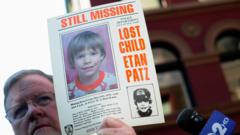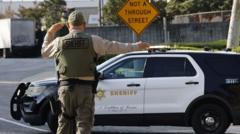In a striking exchange bearing the complexities of the 2016 election, ex-President Barack Obama has countered Donald Trump’s recent accusations regarding alleged treasonous actions tied to Russian meddling, branding them an "outrageous distraction."
Obama Responds to Trump’s 'Treason' Claims Amid Election Meddling Controversy

Obama Responds to Trump’s 'Treason' Claims Amid Election Meddling Controversy
Barack Obama rebuffs Donald Trump's allegations of 'treason' linked to the 2016 election.
Trump's assertion surfaced following a report by Director of National Intelligence Tulsi Gabbard, which claimed Obama orchestrated a long-standing coup against him. The allegations emerge amid renewed scrutiny of late sex offender Jeffrey Epstein and challenges around the release of pertinent details. During a press conference, Trump claimed Obama's actions were treasonous—a claim that drew immediate, sharp rebuttal from Obama’s spokesperson Patrick Rodenbush.
Rodenbush noted that while the Obama office usually refrains from engaging with what he labeled "nonsense," Trump's statements warranted a response due to their absurdity. The context for Trump's claims revolved around a declassified intelligence report suggesting that intelligence assessments regarding Russia's interference in the election had gone unacknowledged or were manipulated by Obama officials.
Despite the incendiary rhetoric, thorough investigations, including one by former special counsel Robert Mueller and a bipartisan Senate report, concluded that while Russia indeed aimed to assist Trump, there was no evidence suggesting that his campaign colluded with the Kremlin. As the ongoing discussions on election integrity and past accusations of wrongdoing unfold, this political back-and-forth highlights the enduring divisions in American politics—one characterized by past grievances and unyielding suspicions about election security.
Rodenbush noted that while the Obama office usually refrains from engaging with what he labeled "nonsense," Trump's statements warranted a response due to their absurdity. The context for Trump's claims revolved around a declassified intelligence report suggesting that intelligence assessments regarding Russia's interference in the election had gone unacknowledged or were manipulated by Obama officials.
Despite the incendiary rhetoric, thorough investigations, including one by former special counsel Robert Mueller and a bipartisan Senate report, concluded that while Russia indeed aimed to assist Trump, there was no evidence suggesting that his campaign colluded with the Kremlin. As the ongoing discussions on election integrity and past accusations of wrongdoing unfold, this political back-and-forth highlights the enduring divisions in American politics—one characterized by past grievances and unyielding suspicions about election security.




















